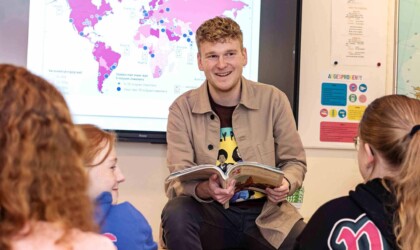The youth sector is under pressure: the number of clients is increasing, care demands are becoming more complex, and due to staff shortages, there is less room to train new professionals. As a result, there is an increased risk of youth professionals dropping out within two years of graduating. They either seek other jobs or experience burnout. It is important to reverse this downward spiral and enhance the resilience of youth professionals so that they experience more job satisfaction and improve the quality of care.
This research focuses on strengthening the resilience of novice youth professionals by emphasizing meaning in work, to prevent early dropout among young care providers. Meaningful work is related to engagement, job satisfaction, and craftsmanship, which could serve as protective factors against dropout. There is close collaboration with stakeholders in youth care practice—students, novice and experienced youth professionals, and their supervisors—as the knowledge and expertise of these participants are considered essential.
Practical experiences
In 2023, a literature review was initiated to explore the relationship between resilience in youth care and meaningful work. This will be followed in 2024 by focus group interviews with Pedagogy students from HZ University of Applied Sciences, novice youth care providers, experienced youth professionals, and supervisors from youth care organizations in Zeeland. In-depth interviews with students, beginners, and youth professionals who stopped working within three years of graduating will provide additional insights into practical experiences in this field.
Based on the results of the literature review and (focus group) interviews, an educational intervention will be developed in 2024-2025 by an action group consisting of representatives of the stakeholders: students, novice and experienced youth professionals, supervisors, and education professionals. In 2025-2026, this educational intervention will be implemented at HZ University of Applied Sciences, and its impact on students and novice youth professionals will be examined. The research results will lead to conclusions that are directly applicable in education and practice.
Initial results
On Tuesday, September 10, 2024, the initial results of the literature review and practical exploration were shared during a research meeting at HZ in Vlissingen. In this constructive meeting with a positive atmosphere, attendees engaged in a dialogue about the relevance of the findings from the literature review and practical exploration, missing focus points, and educational opportunities arising from these insights.
The findings from the literature review, which highlighted the role of meaning-making in influencing risk and resilience factors through balancing, parallel, and transformative processes, were recognized by professionals in the field. Notably, secondary trauma and work-life balance were emphasized. The shared themes and differing perspectives on resilience in relation to meaning-making from the practical exploration also resonated: the strong sense of responsibility among new professionals and its downside, particularly when perfectionism and difficulty in seeking help undermine the resilience of beginning youth care workers.
The perfectionism and internally experienced pressure faced by starting youth care workers were linked to macro-level factors, which were underrepresented in the presented results: organizational pressure due to staff shortages, societal frameworks, and the influence of social media. Together, these factors create a tension for newcomers, who face high expectations in an environment with little room for onboarding, compounded by a diminished work-life balance influenced by social media.
The key educational takeaway for enhancing resilience rooted in meaning-making at work lies in increasing students' self-awareness and personal leadership skills. Additionally, a structured onboarding process within a supportive environment is essential for fostering resilience based on meaning-making. In such an environment, beginners feel seen and valued, and they are allowed to learn from their mistakes within a supportive team. This calls for a collaborative approach between education and the professional field to bridge the gap for newcomers. This approach should nurture their identity development and reflection on personal and professional experiences in a continuous line from education into practice.








